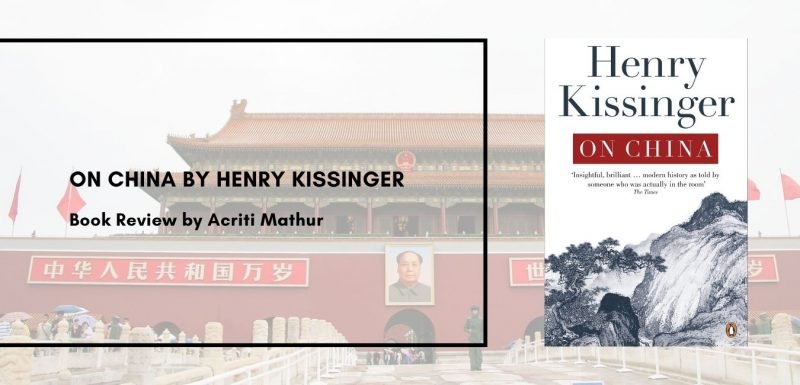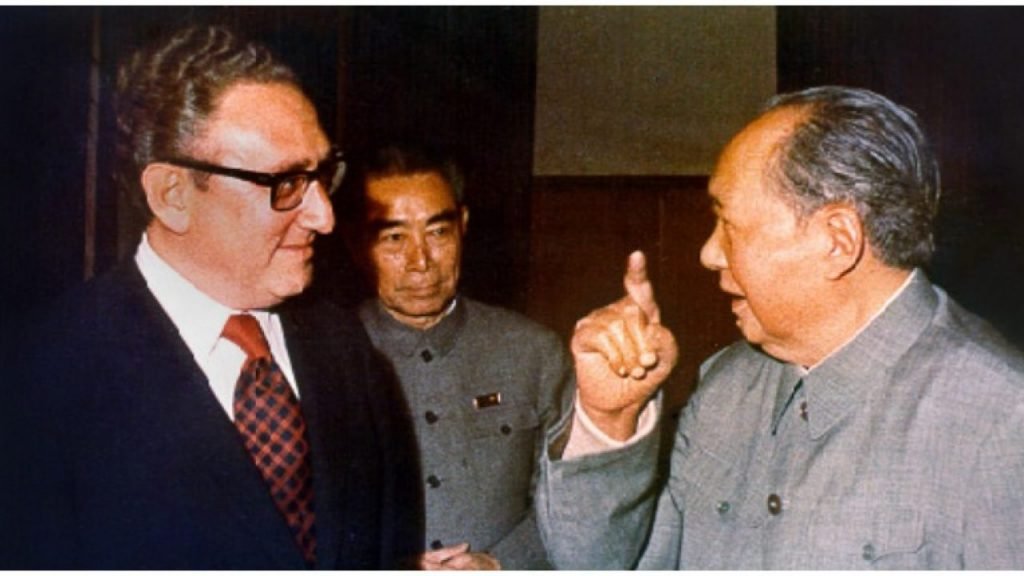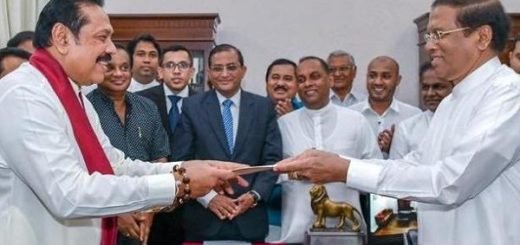On China by Henry Kissinger: Book Review

On China is a historical account of Chinese political history with reference to its foreign policy and diplomacy. Authored by Dr Henry Kissinger, the ex-US Secretary of State and former diplomat, the book has a dual approach in describing China. While one approach rests on Chinese history, another is an emphasis on US-China relations especially Kissinger’s personal experiences. Kissinger was the pioneer involved in the US-China rapprochement policy.
As accounted by Kissinger, negotiations of China with the US took different turns with the change in leadership on both sides and the changing international scenario. These historical events are described in chronology till the early 21st century.

As one of the oldest civilizations in world history, the book describes the fact that pre- modern China can be traced back to the period before Confucius i.e. 600 BC wherein various dynasties ruled China. What is pertinent to learn about pre-modern China is the understanding of the Chinese people with regard to the country as the ‘middle kingdom’ or zhongguo i.e. the land between Heaven and Earth, with the rulers having the Mandate of Heaven.The ‘Great Wall’ was built to protect the Chinese land from being conquered, with the aim that ‘barbarian coalitions’ i.e. communities outside of China do not pose a threat to the same land. This was done by using the tactic of pitting ‘barbarians against barbarians’. The Chinese have therefore been able to assimilate all those ‘infiltrators’ who wanted to dominate and conquer the Chinese land by claiming that such a vast land requires the expertise of the Chinese ‘methods, language and bureaucracy’ which would eventually lead these conquerors to come under the Chinese leadership itself.
Get your copy of On China by Henry Kissinger
The above traditional context in Kissinger’s words is oversimplified but remains important in order to explain Chinese foreign policy which is based on wei qi, a game which is discussed by Sun Tzu in his Art of War. The idea derived from the game is that of strategic encirclement which is very different from the Western form of realpolitik. It is contrasted with the game of Chess which is more western in its notion, seeking to eliminate the opponent once and for all. The former on the other hand, seeks to avoid direct conflict and gain relative advantage by surrounding the enemy from all sides. This also advocates psychological encirclement, which according to Kissinger remains the central unique feature, in the way Chinese diplomacy and military progressions have taken place.
The ideas derived from wei qi are very important to the idea of China as an integrated nation and the culture that the people of China are proud of. This brings Kissinger to discuss the varied nature of colonization that China faced. However, be it the defeat of the Chinese in the Opium Wars against the British or the dominance of the Japanese, the pride of the Chinese nation has always remained the priority reinforcing the idea of strategic encirclement in a stronger form in order to counter the Western forms of imperialism.
According to Kissinger, the individual powerful personalities of Chinese leaders gave direction to the nation in subsequent years. His association with leaders like Mao Zedong and Deng Xiaoping and the anecdotes associated with them, form important and dominant parts of the book. Describing Mao, Kissinger discusses the important events in Chinese politics post the Communist Revolution, highlighting Mao’s vision for China as he says that the ‘Chinese people have stood up’.
Mao pursued a foreign policy which was focused on the reiteration of Communism as a superior ideology against western imperialism, while also focusing on the need to secure Chinese peripheries and maintaining the primacy of China in Asia and the world. He also followed the radical domestic policy of transforming China internally by overturning the Confucian philosophy and empowering the peasants which then became the basis for his Cultural Revolution, and the entering of the Korean War making China a stakeholder in the Cold War. Tackling other issues like the Taiwan Strait Crisisand the Sino Soviet splitwhile the continuous internal transformation within China depicted the psychological elements involved. The aim was to avoid encirclement from the outside and take China forward in the world political order. Chinese assertiveness was also depicted through Mao’s efforts in maintaining the idea of the Peoples’ Republic of China (PRC) as the ‘real China’ as opposed to Taiwan.

Kissinger’s main description is that of the rapprochement wherein he was closely involved with the Chinese leaders, the description of which becomes problematic and intriguing at the same time. It can be said that Kissinger had his own set of ‘favourites’ and Mao Zedong was not one of them. While describing the bilateral negotiations in the Cold War context, Kissinger depicts how both sides resented such an alliance. However, such an alliance was important for both parties in order to gain leverage over the Soviet Union. Though the rapprochement (in the form of various Communiqués), was full of contradictions on one hand and gradual progress on the other, his description of Mao Zedong reflects some sense of American superiority irrespective of his vivid knowledge of the Chinese ways, means and culture. His writing often reflects Mao’s method of talking as irksome while his liking towards Premier Zhou Enlai is also reflective when he calls him ‘compelling’ and ‘sharp’. What is more intriguing is his method of vividly describing each Chinese leader and his mind.
Detailing the end of Mao era and the crisis of succession, Kissinger gives an account of the coming of Deng Xiaoping to power who according to Kissinger “had the courage to base modernization on the initiative and resilience of the individual Chinese.”
Get your copy of On China by Henry Kissinger
Kissinger’s impressed attitude with Deng Xiaoping had much to do with his ability to lead China into another revolution of sorts wherein China became more ‘socialist’ from Communist. Kissinger describes Deng as having the power and ability to show people the benefits of capitalism urging them to indulge in the development of the Chinese economy, the stagnation of which had set in during the Mao era. However, as highlighted by Kissinger, the Chinese leadership did not ‘like to be told what to do’ and this was the tendency of Americans. In this context, the world witnessed the human rights issues that arose within China, in the form of the Tiananmen Square shooting of students rebelling against the Chinese leadership. This put the US in a flux and it imposed sanctions upon the Chinese government for the massacre also hampering trade relations.

Kissinger recounts that Chinese leadership on one hand, saw its own actions as superior highlighting that China was not ‘scared’ of sanctions and that the force of the PRC was supreme in order to sustain the country. It was therefore up to the US to maintain relations with China which according to Deng could happen in those times keeping ideology aside.
What follows is a deterioration of relations between US and China while trade relations are still maintained. The parabolic nature of US-China relations with changes in leadership sees a turning point with the leadership of President Bill Clinton who aimed to ‘democratize’ China through posing conditions on China’s Most Favoured Nation status i.e. the extension would only be given by addressing human rights violations. In this light negotiations resulted in China refusing to adhere to these conditions and USA ‘pleading’ for other means of containing human rights violations. This has depicted that Chinese politics has remained a challenge in the international world order while at the same time, its immense economic progress has compelled nations to maintain economic relations with China. Kissinger has concluded by quoting Immanuel Kant “the world is at a juncture of perpetual peace either by individual’s own sense or by massive conflicts leaving no other alternative.” In this sense, the US and China should head towards building a relationship in the international world order.
The book therefore offers an informative insight into the history of US-China relations which has influenced the present. In addition, it shows us the tendencies of China as far as foreign policy is concerned. The practice of encirclement has been witnessed in Chinese foreign policy when it comes to its peripheries even today and the uncompromising attitude towards its primacy is evidenced in today’s aggressive China which indicates its resolve to remain powerful irrespective of domestic issues in relation to the COVID-19 pandemic. Further, Kissinger’s take on the US-China relationship is relevant for the present times, when there is increasing confrontation between the two due to the pandemic, digital age and China’s rise as a great power. It only indicates that long term confrontation is not in the interest of the two countries and building a cooperative relationship in the world order should be the way forward.



















